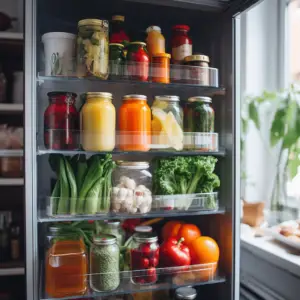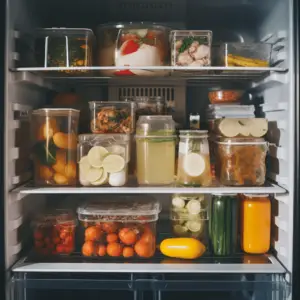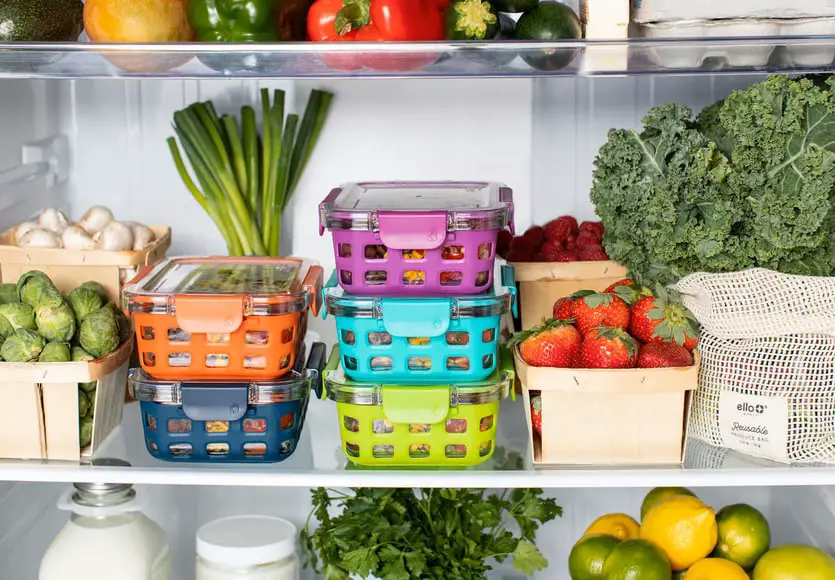Some bacteria and microorganisms can harm us. We all know that and that’s why we do our best to put them away to avoid their damage. One example of such bacteria includes botulism. But can botulism grow in your refrigerator?
Well, this is one of the most common questions but the answer is often misunderstood. In this article, we’ve included all the information you need to know about whether botulism can grow in the refrigerator, as well as the pertinent details about botulism.
Table of Contents
What is Botulism?

Botulism refers to rod-shaped bacteria that grow best under anaerobic or rather low oxygen, low salt, and low acid conditions. This kind of bacteria growth is inhibited by refrigerators below 4 degrees Celsius, heating above 121 degrees Celsius, and high water acidity.
Even though the toxin can be destroyed by heating to 85 degrees Celsius for at least five minutes, the spores created by the bacteria are not dead unless the food is heated under high pressure to 121 degrees Celsius for at least twenty minutes.
Botulism is known to be one of the deadliest types of food poisoning mainly because it goes after the nerves in the body. It puts a strain on breathing, which in turn causes muscle paralysis. And in the worst case, it can lead to death.
So Can Botulism Grow In the Refrigerator?
Simply put, botulism cannot thrive in the refrigerator as it cannot grow in temperatures below 12 degrees Celsius. However, if an open can containing food with botulism is refrigerated, the bacteria will thrive and reproduce.
What You Need to Know About Botulism Bacteria
Although botulism is not a common well-being problem, it can be caused by toxins from the Clostridium botulinum bacteria. This infection is identified in three common ways that directly affect the human body, which are: Food botulism, Infant botulism, and Wound botulism.
Irrespective of whether the problem is detected among the three stated ways, it remains a critical health condition and demands immediate medical attention.
According to research done by the CDC, factors such as low oxygen, sugar, salt, and certain temperatures provide a thriving environment for botulinum toxin spores to grow and become actual toxins.
Other factors that support the growth of botulinum toxin to grow include fermented items, home-canned, and not well-preserved foods.
There aren’t specific guidelines for vacuum-packed foods, whether commercially packed or basically cooked. It is best to consider that botulism is not the only type of foodborne illness that can develop in the refrigerator.
While botulism can be diagnosed based on clinical symptoms, its variance from other diseases is often difficult, particularly in the absence of other known individuals affected by the condition.
Once detected, though, the most effective and straightforward way to confirm the diagnosis of botulism in the lab is to test for the presence of the botulinum toxin in the stool, serum, or gastric secretions of the patient. Obviously, food consumed by the patient can also be tested for the presence of toxins.
Currently, the most sensitive and commonly applied method for detecting the toxins is the mouse neutralization test. This involves injecting serum into mice and checking for signs of botulism. In some cases, botulism may go undetected because symptoms are transient, or mild.
How Long Does Botulism Take to Grow
Given the right conditions, the botulinum toxin which causes botulism can develop into lethal toxins within two days. That said, various medical assertions postulate that the toxins can become fully grown in four hours. Others have it that it can take up to eight days before they are created.
In fully canned food, it will take botulism about three to four days to thrive and become fully lethal. When the bacteria are developing in canned food, it is possible to realize as the container will start to become bulgy and swollen.
The container may spurt foam or any liquid substance when opened. The canned food will most likely be smelly and discolored. Canned foods are usually the breeding ground for botulinum toxin, so there’s a need to be cautious about their consumption.
Always make sure the food in the canned containers is still and does not create any of the substances mentioned above.
Can Botulism Thrive in Plastic Containers?

Botulism can grow and thrive on every surface, including plastic containers. Although it may not necessarily develop on synthetic surfaces, it can thrive just fine deep within it. Remember that botulism only requires a slight amount of oxygen, temperature salt, and acid to grow. In the event that it gets that in a plastic container, even in a toilet sink, it will thrive unhindered.
Similarly, you could be wondering if botulism can grow in Vinegar. Fortunately, these bacteria will never thrive in vinegar. This is mainly because vinegar contains a concentration of acetic acid, which is detrimental to the formation of botulism. Therefore, botulism cannot grow or develop in vinegar.
Conclusion
As we have seen, it’s not common for botulism to grow in a refrigerator, which ultimately becomes an excellent strategy to combat the formation of the bacteria. In fact, some sources suggest that you make sure that all foods are refrigerated to prevent botulism.
In addition, keeping a wound clean is important to prevent wound botulism. Parents should keep their children away from honey as it can cause infant botulism. Note that honey is only safe for children above one year. Honey products should not be given to infants. They could easily contract infant botulism from such items.


